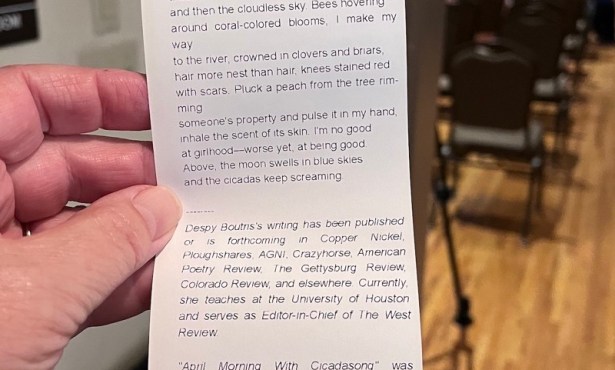The Winter’s Tale at Theater 150 in Ojai
Upcoming Production of Shakespeare Emphasizes Role of Time

As we grow older, the one thing we all want is more time. Well, Jessica Kubzansky, director of Theater 150’s production of The Winter’s Tale, is happy to oblige.
Time, you see, is not only a major thematic element of this late-Shakespeare masterpiece: He’s also an actual character, a sort of one-man chorus who directly addresses the audience. Time emerges at the halfway point of the play, just after intermission, and informs us that 16 years have passed since the conclusion of the previous act. His interlude is brief, informative, and, well, timely.
But the Ojai production, which features a cast of professional, Los Angeles-based actors, will be more time-intensive than most. Kubzansky, who received an Indy Award for last summer’s Theater 150 production of Hamlet, realized one way to tie together the various strands of this gloriously unwieldy play was to have Time drop in from time to time.
So, in her staging, Time emerges at the play’s beginning and returns for several additional appearances, reciting time-related material Kubzansky has culled from Shakespeare’s sonnets.
“For me, this is really Time’s play,” she explains. “Everybody can repent, and people can offer forgiveness, but Time is the one pitiless character in the play. He can never pause or go back. He can only march forward. That’s a very important part of the play for me.”
The Winter’s Tale isn’t staged all that often, primarily because it’s a tricky piece to pull off. It is, in many respects, two distinctly different plays: a tragedy driven by mistrust, isolation, and jealousy, followed by a comedy rooted in reconciliation and romance. Its first half is reminiscent of Othello, while the second is closer in spirit to As You Like It.
“It is such a universal story—two guys and a girl,” Kubzansky notes. “They’re best friends, until one suddenly decides the other has touched his wife in a forbidden way. That sort of thing happens every day.”
Except in this case, the two childhood buddies are absolute monarchs: Leontes, king of Sicilia, and Polixenes, king of Bohemia. Polixenes is preparing to return home after a lengthy visit with his old pal when Leontes suddenly accuses him of having an affair with his wife, Hermione.
Gripped by this groundless belief, Leontes angrily unleashes a series of events Kubzansky likens to circles in a pond after someone has thrown a stone into the water. The ripple effects travel far and wide, sparing no one and leading to the loss of several lives.
But the characters’ emotional wounds do eventually heal, albeit only after years have passed and much suffering has been endured. The Winter’s Tale is a realistic portrait of the pain caused by willfulness and egocentrism, but it culminates in hard-earned happiness and deeply felt forgiveness.
“The play shows how love can get thwarted and misshapen,” Kubzansky says. “Incredibly human foibles lead people to do terrible things that have painful consequences. I don’t see a lot of similarities between this play and Hamlet, but I do think that both Hamlet’s brain and Leontes’s brain get diseased for a little while.”
A few people no doubt wonder whether that description also applies to producing artistic director Chris Nottoli, who opted for this relative rarity rather than a safer, better-known play. He and artistic director Deb Norton were so pleased with last year’s Hamlet that when Kubzansky (who serves as co-artistic director of a Pasadena theater company) suggested The Winter’s Tale, they eagerly agreed.
“Jessica brought forth Hamlet in such an accessible way, with such clarity, that even people who dislike Shakespeare came out saying, ‘That was an amazing night,’” he says. “She has a way of telling a story. We may not sell out opening weekend, but people will quickly hear about it from their friends.”
Nottoli’s troupe is presenting the play on a large, outdoor stage being constructed in the courtyard of Chaparral High School (414 E. Ojai Ave.). Scenery will be sparse, but Nottoli promises “really gorgeous costuming and some amazing puppetry.”
The seating area will hold about 250 people, in the bleachers and on the lawn. (Bring a jacket.) It’s a temporary arrangement: The company plans to move into the Libbey Bowl, which is currently undergoing renovation, for the summer of 2012 and beyond.
Meanwhile, in its 80-seat indoor space across the street (316 E. Matilija St.), Theater 150 is presenting an original musical titled Love’s Labour’s LOST. It’s a mash-up in which characters from the TV series LOST enter the world of Shakespeare’s comedy. Niki Blumberg wrote the book and music for the show, which “has a late-night flavor to it,” according to Nottoli.
Many of The Winter’s Tale’s characters can also be described as lost, physically and/or emotionally. But most find their way home, and Kubzansky notes their ultimate contentment “is all the sweeter for being so hard-earned.” Life isn’t easy, Shakespeare shows us, but things sometimes work out—in time.
4•1•1
The Winter’s Tale will be staged at 8 p.m. Thursday through Sunday, and Love’s Labour’s LOST at 10 p.m. on Fridays, 5 p.m. on Saturdays, and 2 p.m. on Sundays, through August 1. Tickets are $17-$34. For information and directions, call 646-4300, or go to theater150.com.



